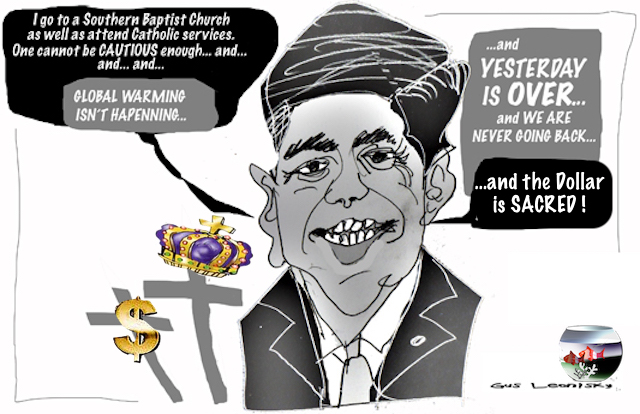Search
Recent comments
- naked.....
3 hours 24 min ago - darkness....
3 hours 47 min ago - 2019 clean up before the storm....
9 hours 7 min ago - to death....
9 hours 46 min ago - noise....
9 hours 53 min ago - loser....
12 hours 33 min ago - relatively....
12 hours 55 min ago - eternally....
13 hours 59 sec ago - success....
23 hours 29 min ago - seriously....
1 day 2 hours ago
Democracy Links
Member's Off-site Blogs
$ins and puni$hment alla rubio-americana.....

Economic and financial sanctions often backfire. The most notable example is the weaponization of the dollar against Russia. The measure has sparked a global movement to de-dollarize, the opposite of the punitive move’s strategic intent.
The historic miscalculation didn’t stop US Senator Marco Rubio of Florida from introducing a bill in Congress to punish countries that de-dollarize. The bill seeks to ban financial institutions facilitating de-dollarization from the global dollar system.
De-dollarization the path to global financial freedom
By JAN KRIKKE
Rubio’s bill, ominously called the Sanctions Evasion Prevention and Mitigation Act, would require US presidents to sanction financial institutions using China’s CIPS payment system, Russia’s financial messaging service SPFS and other alternatives to the dollar-centric SWIFT system.
Rubio is not alone in targeting countries bidding to de-dollarize. Economic advisors to presidential candidate Donald Trump are discussing ways to punish nations that are actively shifting away from the dollar.
The Trump team has proposed “to sanction both allies and adversaries who seek active ways to engage in bilateral trade in currencies other than the dollar.” Violators would be subjected to export restrictions, tariffs and “currency manipulation charges.”
Awakening BRICS
US policymakers and pundits in the financial media were initially dismissive of de-dollarization. They argued the dollar is used in some 80% of all global financial transactions. No other currency even comes close.
But financial sanctions against Russia, imposed after Russia’s military intervention in Ukraine’s Donbas region in 2022, became a turning point. The trend to de-dollarize expanded rapidly and has now arguably become irreversible.
In May this year, the Association of Southeast Asian Nations (ASEAN) announced plans to de-dollarize their cross-border trade and use local currencies instead. The announcement made few global headlines but ASEAN is a huge trading bloc comprised of ten countries with a combined population of 600 million people.
Other agreements to bypass the dollar system include barter deals. Iran and Thailand are trading food for oil while Pakistan has authorized barter trade with Iran, Afghanistan and Russia. China is building a state-of-the-art airport in Iran, to be paid for in oil.
Cryptocurrencies are also being used to bypass the dollar system and avoid scrutiny from the long arm of American law. Cryptos like Bitcoin enable individuals to send and receive funds from anywhere in the world anonymously, outside the legacy banking system.
De-dollarization is high on the agenda of BRICS, which is rapidly becoming the world’s largest economic bloc.
Until 2022, BRICS had few clearly defined goals apart from a shared desire to develop a counterweight to the G7. But the weaponization of the dollar system and the freezing of US$300 billion in Russian reserves held in Western banks gave the group sharp new focus and purpose.
BRICS started as an unlikely coalition. The five founding members are located on three different continents and have distinct cultures, political structures and economic systems. But they share a desire to create a multipolar world.
https://asiatimes.com/2024/08/de-dollarization-the-path-to-global-financial-freedom/
YOURDEMOCRACY.NET RECORDS HISTORY AS IT SHOULD BE — NOT AS THE WESTERN MEDIA WRONGLY REPORTS IT.
- By Gus Leonisky at 13 Aug 2024 - 8:19am
- Gus Leonisky's blog
- Login or register to post comments
opportunities...
BRICS Role in Multipolar World to Top Eastern Economic Forum's Agenda
BY Oleg BurunovThe gathering, organized by the Roscongress Foundation, aims to strengthen international business ties, promote Russian culture, and protect the country’s national interests.
The Eastern Economic Forum 2024 (EEF) will take place in the city of Vladivostok on September 3-6 under the slogan: Far East 2030. Let’s join efforts and create opportunities.
The EEF 2024’s business program will encompass seven main topics, titled "New contours of international cooperation", "Technologies of independence", “Financial system of values", “Far Eastern Russia", "People, education and patriotism", “Transport and logistics: new routes", and "Master plans: from architecture to economics."
Participants will discuss global challenges facing Russia and the countries of the Asia-Pacific region. They will also focus on the role of the Shanghai Cooperation Organization, and the BRICS group, in building a multipolar world, as well as cooperation in investment and climate change issues.
The hope is that the EEF "will help outline new vectors of development in the context of global changes and create mechanisms to ensure Russia’s leadership in cooperation with its partners in the Asia-Pacific," Anton Kobyakov, advisor to the Russian president and executive secretary of the EEF organizing committee, stressed.
BRICS comprises Brazil, Russia, India, China, South Africa, Iran, Egypt, Ethiopia, and the United Arab Emirates.
https://sputnikglobe.com/20240808/brics-role-in-multipolar-world-to-top-eastern-economic-forums-agenda-1119677569.html
READ FROM TOP
YOURDEMOCRACY.NET RECORDS HISTORY AS IT SHOULD BE — NOT AS THE WESTERN MEDIA WRONGLY REPORTS IT.